Single crewing survey highlights concerns over officer safety
THERE must be appropriate numbers of police officer to respond to incidents as
Zuleika Payne was responding to a survey from the Police Federation of England and Wales which showed seven out of 10 police officers have said they were single-crewed either often or always in the last 12 months.
The Police Federation of England and Wales said: “Officers frequently
“The concern here is around officer safety,” said Zuleika. “While it might be argued that forces, in particular South Yorkshire, look at areas of peak demand, they don’t always lend themselves to effectively matching resources to demand.
“You look at the incident involving PC Lisa Bates [who was attacked with an axe responding to a call]. She could have lost her life. It was a seemingly routine call, it was not during the night, it was not during a weekend or a Bank Holiday.
“Now looking at what unfolded and the horrific injuries that have been sustained, thankfully Lisa had someone with her, but we could be looking at a very different outcome.
“The organisation understands that single crewing facilitates us having wider visibility but again that isn’t always achievable because of the lack of police vehicles as well. So on one side you’ve got the urge to have that visible presence, Bobbies on the beat, the police vehicles out there, but you’ve also got to weigh that up against officer safety and effectiveness by being double crewed.”
Zuleika said that currently South Yorkshire Police “does not have the luxury of double crewing perhaps as much as we would like to” because of a lack of officer numbers.
She added: “What we have to do is look at crime pattern analysis and try as best we can to match resources to demand. But when you speak to the troops they are so strapped for officers that the double crewing does not take place as frequently as we would hope.
“With the police service we are the last port of call, so we don’t have the option to say, ‘No’. But when officers are travelling to

